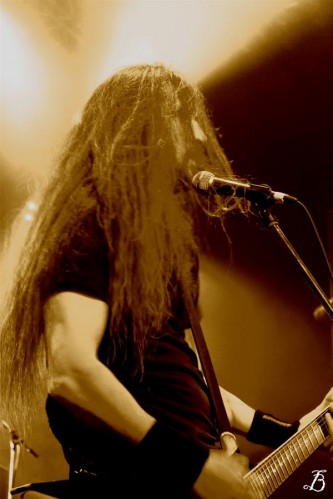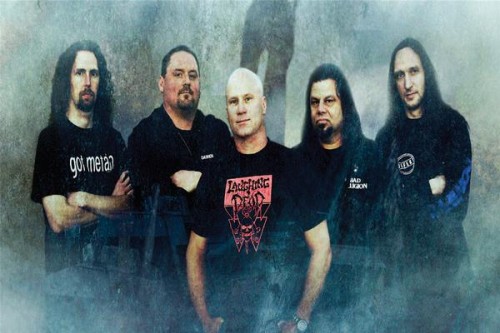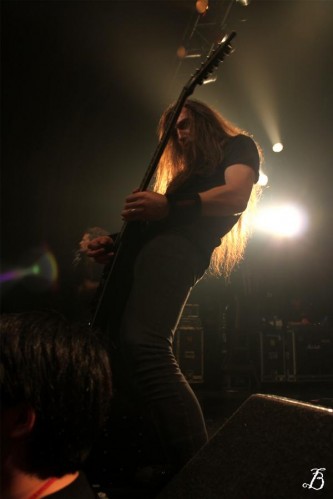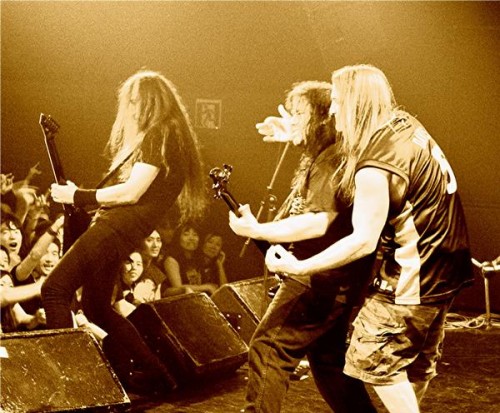Lee Altus
by Alissa Ordabai
Staff Writer
 Championed by the industry as the next big thing some 20 years ago, Heathen was not only the band which at the time embodied the spirit of all things new in metal, but, in fact, one of those acts who have invented the entire genre of thrash alongside with Metallica, Testament, Megadeth, and other innovators hailing from Bay Area. All those who in the beginning of the Eighties transformed the music scene and gave the word “metal” an entirely new meaning it still bears to this day.
Championed by the industry as the next big thing some 20 years ago, Heathen was not only the band which at the time embodied the spirit of all things new in metal, but, in fact, one of those acts who have invented the entire genre of thrash alongside with Metallica, Testament, Megadeth, and other innovators hailing from Bay Area. All those who in the beginning of the Eighties transformed the music scene and gave the word “metal” an entirely new meaning it still bears to this day.
Fast-forward to 2010 and Heathen are back with an album which has been two decades in the making, giving all true metalheads a taste of authenticity which bands today are hardly capable of replicating. And here we are talking not only about the new guard, but also Heathen’s pioneering contemporaries who these days have stridden a long way from the original formula.
What really strikes you about “The Evolution of Chaos” is not just the unmistakable taste of the real thing – whiplash riffs that go straight for the kill, semi-operatic vocals, wall-of-fire rhythm section and riotous firework solos. It is also the urgent, driven atmosphere of thrash’s early days which the new album distills into 11 tracks, the spirit of the genre’s initial aspiration before the whole thing got swallowed by big business. The sense of urgency, the conviction, and even, surprisingly, at times the bona fide naïveté of those golden days, and hence sincerity of the message.
With some material on the record in fact dating as far back as mid-Eighties, the album also shows with amazing clarity the common ground from which Bay Area acts drew their inspiration and which marks them as the children of the same environment who started off on the same aspirations. But what Metallica have over the years lost in spirit and conviction, Heathen have managed to retain, and what Alex Skolnick these days has turned into an almost intellectual pursuit, Heathen’s founding member Lee Altus continues to go for with such primordial fire and fury it makes you wonder if he’s found a way to travel back in time to breathe the Bay Area air circa 1985 each time before going into the studio to throw down those show-stopping solos.
While brilliant execution turns the pleasure of listening of this record into a luxury, the material itself could be seen as a panorama of the development of thrash. From the propulsive, tightly wound rage of “Control by Chaos” to magnificent complexity of “No Stone Unturned”, the record is as diverse as the genre allows it to be. But given its wide spectrum of moods and atmospheres, at the same time it gives a unified, coherent rendition of the road walked by thrash since its early days to 2010.

Guitarist Lee Altus and vocalist Dave White being the only original members on board this time around, the band (in part due to the fact that Altus has always been its main songwriter) have still managed to give the album that classic, unmistakable Heathen sound. And while Altus blames grunge for the demise of the band in the early Nineties, the fact that he never gave up on the music he loved shows that a real musician can be as flexible as he is determined.
After two decades spent pursuing other goals – playing in die Krupps in the Nineties (and while doing that living in Germany) and later joining Exodus where Altus continues to play since 2005, he has decides to revive his old band properly by releasing brand-new material and thus showing that music can exist beyond vanity, ambition or remembrance. For the first time since 1986 Heathen are enjoying being involved in a pure creativity without allowing themselves to be pressured by any external considerations.
What makes a musician stick to his guns and to his vision despite the changing fashions, the inspiration behind Heathen’s resurrection and the new record, as well as his creative process and what makes people care about guitar solos were some of the themes Hardrock Haven has touched upon in this interview with Lee Altus just before Christmas.
 AO: Lee, thank you for finding time to do this interview with us. We really appreciate your time.
AO: Lee, thank you for finding time to do this interview with us. We really appreciate your time.
LA: No problem.
AO: And congratulations on the new album!
LA: Thank you.
AO: Are you happy with the way this record has turned out?
LA: Yeah, overall happy, but are you ever really happy? I heard this, I think it was this a guy from that band Boston, or some other band, who said, “You never ever finish an album, you abandon it.”
AO: That’s what Bruce Kulick said to me a few days back, and he said that this originally came from Sting!
LA: Well, here you go then! When somebody said it to me, it sounded perfect, and I thought, “I will use that!” Because you either run out of time, run out of money, or something. You are never totally happy, you just have to be happy enough.
AO: Do you have favourite tracks on this record?
LA: Favourite tracks? Hmm… Yeah, I guess it would be “No Stone Unturned”, that was the most challenging to record. I would have to say that this one probably is my favourite. But it could change all the time when you write. Whatever is the first song you wrote, by the time you have finished the fifth one, that one is already old you are sick of it. Whatever is the newest one you think is the best one because it’s still fresh.
AO: But “No Stone Unturned” had so much clarity, and spirit, and mystery, and beauty to it that it really took me back to the very early days of thrash – mid-Eighties, early Eighties. Was it a conscious decision to look back and to give an overview of the history of the genre, or did it just come to you spontaneously?
LA: No, it really is spontaneous. I can’t even say it’s spontaneous, it developed over the years. Like you said, some of those riffs were probably written in the Eighties, I don’t even remember because that song developed over such a long time. Sure, it kept changing a little bit here and a little bit there. When you have a lot of time to sit around and wait… But overall, yeah, with Heathen we always had that sprit of the Eighties, and the spirit of the Eighties is kind of all we know. It’s not like with the new thrash bands that are trying to sound like the Eighties. We actually grew up and learned in the Eighties, so it’s natural.
AO: But you listen to “No Stone Unturned” and you listen to “Controlled by Chaos” and you realise how much you, and Megadeth, and Metallica actually have in common, in terms of your roots, where you came from, and that is really amazing. But what inspired you to revive this band and to start writing for it again?
LA: We always talked about it after grunge kind of killed us in the Nineties, saying, “We should put out at least one more album. We have all those riffs and songs, might as well release them.” It was me and Dave [White, vocalist] talking about it. But seriously it came together I think in 2002 or 2003 at Chuck Billy’s benefit. And we actually got together and played, and it was fun again. It was like, “Wow, maybe we should seriously start talking about it and start seriously doing it because we are having fun again.” What finalised it is when we got invited to play that year at Wacken, or if it was the following year I don’t remember, but it was within that year that we played. And at that time we definitely decided to do this, to give it another go, at least to release an album, see what happens.

AO: How long did it take you to make this album – to go from the initial snippet of an idea to the finished product?
LA: If you take it from the original snippet, it would be almost 20 years!
AO: Ha, all right!
LA: I was writing some of those riffs for the follow-up to “Victims of Deception” in 88. So it was supposed to be our next album, it was supposed to take a year or two, maybe three in between, but, unfortunately, it took almost twenty years.
AO: In terms of emotional and intellectual effort that it takes to make an album, which one, do you think, was the most difficult to make – “Breaking the Silence”, “Victims of Deception”, or this one?
LA: I think “Victims of Deception” was the hardest because when we released “Breaking the Silence” everyone was hailing us like, “Oh, you guys are going to be like the next Metallica,” so many promises, every label wanted us…
AO: And you were on MTV…
LA: Yes, and every big management wanted us, everybody was all of a sudden… When you’re hot, all of a sudden everybody wants in. So there was so much pressure that all of a sudden we sat back and realised that we had to put out a great album. Before that we were writing the songs and hoping that everybody would like them. Then you realise that everybody does like it, now everybody is looking to see what you can deliver NOW. So “Victims” was the most stressful album, I would say.
With this one, again, it was this feeling, like, “You know what, we are in our 40s now, it’s not like… We’ll try to make an album, but it’s not like we are going to make it big now.” It’s more like, “Ah, now we are making it again for our own pleasure, just like the first one. Now we don’t care: if it sells, it sells, if it doesn’t, it doesn’t. As long as we are happy with it, it’s all that really counts.” So it was like going from that stressful “Victims” album to this one where we don’t care. As long as we like it, that’s all that we really care about.
AO: How does your songwriting process work? Do you have to isolate yourself to write or do those things come to you as you go about your daily business?
LA: It could be different. Mostly I have to sit down and isolate myself, lock myself in a room and play a thousand riffs and maybe one will work out, and I’ll go, “OK, that’s one that I can work with. It could work there or I could build a song around it.” Very rarely it would be where I would be sitting just mindlessly playing the guitar and even watching TV at the same time and come up with a riff and go, “Oh!” and run and record it. Mostly you have to kind of force yourself into kind of, “I have to write.” This time, when you have twenty years to write, it’s a lot easier. You can just sit around doing whatever, and riffs will come to you. You just kind of put it in the vault and move on. Every five years you take it out and put another riff in there. If you had to write an album every couple of years, it would be a little bit different.
AO: Would I be correct to assume that sometimes it’s really the instrument that takes you places? It’s not that you first hear an idea in your head, but sometimes your guitar can lead you – the way it’s constructed, the kind of code that there is in this instrument, would that be correct to say?
LA: Yes, sometimes. Anything can influence and take you places. Sometimes even the environment that you are in. And sometimes it doesn’t, it just depends. With some songs you can just sit down and write, and it just flows, and everything comes together so fast. And with other songs you just keep pounding and pounding it into the ground and nothing’s coming out. For this album I had another six or eight songs that were unfinished, and I could not finish them, I wasn’t happy enough. And I already had those riffs for how many years? So I thought that something would probably come up in another ten years that would make me happy with that song, or maybe it will never. You just never know.
AO: But how would you say being a musician in Germany compares to being a musician in the States?
LA: Ha-ha! I guess in Germany they are treated a lot better. My experience that I’ve learnt from die Krupps days, for example, is that you sign with these… I don’t even know how you call it, it’s not a publishing company, but every country has almost like a musicians’ union that protects you and collects your royalties from the record companies. And that is a very powerful thing. Where in the States they don’t have that. From the States, most of the times, unless you make it really big like Metallica when record companies pay attention, they never really pay you those royalties. A lot of musicians are not even aware that they are supposed to get that. And the royalty rate, if you do a research, it’s 725 cents per song in the States. Different countries have different rates, but all over Europe, whatever country you choose, it’s at least double from the States. So a lot more goes into protecting musicians.
And overall, the way they look at us at European festivals. Why doesn’t that work in the States? Even when you do a small club tour, you are treated a lot better in Europe than you are in the States. In the States they just don’t care. “Yeah, we’ve promised you a PA, but here’s your car stereo, deal with it.” Where in Europe people care a lot more about it at the clubs. But that’s what they’ve always said, “You’ve never made it until you’ve made it in the States.” But I always liked Europe. The band that I’ve really liked was Thin Lizzy. They’ve never really made it huge, but everybody knew about them and they were always popular. You’d mention Thin Lizzy and people would go, “Yeah, I know Thin Lizzy,” but they’ve never had that status of a multi-platinum band. I always thought that that would be the coolest thing.
AO: Going back to the album, the solos on it are quite extraordinary. What was the inspiration behind your fire this time around? What inspired you to play these amazing solos and how many were actually improvised?
LA: Ha! How many improvised? I really don’t remember. There are always some parts that are a little bit more worked out and there are some parts that you just work out in the studio. There is nothing there where you just sit there and go, “Wow, I just played it and the first take was it.” I’d be lying if I said that. No, there’s a lot of work that went into that. It’s like constructing another part of the song and it doesn’t come with the very first take. There could be one or two little parts that could be the first take, but mostly it’s sitting down, working it out, and it’s like working on a song within a song.
But overall, with solos, remember when in the Eighties everyone could shred like crazy and everybody wanted to be faster and better, like Yngwie, and then it went up to where people stopped caring and they stopped playing solos altogether. People always like taking it to such extreme… So I wanted to bring back some solo spirit. I don’t care if it’s in or out, but Heathen without solos – I can’t imagine that. That just wouldn’t work for us. I go out there and show people that solos can be cool, you know? Not an enemy of metal or whatever.
AO: What are you making of this new generation of young shredders like Trivium, and Black Tide, and Dragonforce? Do you find any similarities between what was driving you when you were growing up and between them?
LA: Absolutely, I’m just glad that there are youngsters out there all of a sudden who care about playing solos again. Image if I grew up and the generation before me didn’t care about the solos. Who would I learn from? I wouldn’t have my Uli Roth, and my Michael Schenker, and my Gary Moore. Maybe I wouldn’t even ever play a solo because it wouldn’t be out there. I kind of admire these new guys because they have nobody to look up to, unless they skip a whole generation of new metal and grunge, all those guys who really didn’t care about solos. They would have to skip the whole decade to go back, otherwise where do you learn to play solos? It’s pretty amazing and I’m just glad that they are out there and they are embracing it again. It could go over the top again to where everybody is going to overdo it, and people and going to turn around and go somewhere else because they get bored of it. That’s the nature of the music business where something gets popular and then it blows up, and everybody turns and goes somewhere else to look for something new.
AO: How do you maintain your technique these days? Does it still require everyday practice?
LA: I wish I had the time to practice every day. I would probably be better. It’s mostly like cramming in before the exams. You wait until the week before and then you try to do it all at once. Sometimes it works, sometimes it doesn’t. One of the most dangerous things that I’ve learnt is when you try to cram in with the solos, your fingers get so sore that you are unable to do what you want to do. So you kind of have to ease into it. But overall you basically start practicing harder and harder and get your skill back right before you are going in to record the solos. It’s kind of like riding a bicycle – you really don’t forget. If it’s been years, then you have to kind of practice to the level where you were.
AO: Tell me something – do you ever play for yourself? Not for practice, not for anybody else, but purely for your own enjoyment?
LA: Honestly, not any more. When I was younger, then I was, of course.
AO: OK, I have just one more question. Are there any plans to take this album on the road?
LA: We were talking about going out in March next year for two or three weeks to test the waters, so to speak, and we’ll see what happens. We really don’t know to what extent we can go out and promote this album. It’s not like back in the days where most of us would live with our parents and have no rent to pay, and no kids, whereas now some of us have kids and family, so we can’t just stay out and leave your family out on the curb. People are asking to what extent we are going to support this album, and I say that we’ll see. It itself should demand how much support it needs. We are not able to just go out and grind it from the bottom up and work this album, and shove it in everybody’s face. If the album really takes off and we need to go out on the road, then fine, that’s OK, we’ll be able to do that.
Then with my other thing too, with Exodus, there is another album, so there are already two plans to go out next year, and I really don’t know how it’s gonna be. Sometimes maybe we’ll tour together and I’ll have to play two sets which we played in Japan, and it was pretty tough. I might have been able to do that a lot better in my twenties. But doing a whole tour like that – I don’t know… It would be hard, but it’s doable. So I really don’t know how much we are going to tour. We’ll see and play it by ear as we go.
AO: You know, for a lot London fans you are a bit of a mythical figure really. There legends still going around here how you’ve declined a spot in Megadeth, and there is another thing about how you were actually born in Russia. Is there any truth to that?
LA: Yeah, former Russia, which is now Ukraine.
AO: Do you have any memories of the country at all?
LA: Very little because it’s been so long ago, when I was a kid. I remember standing in bread lines with my mom [Laughs], playing hockey with my friends, just kid memories.
AO: Amazing. Thank you for your time, we really appreciate that.
LA: Thank YOU.
AO: Good luck with the album and we’ll hopefully see you in London sometime soon.
“The Evolution of Chaos” is out on January 25, 2010 in Europe and March 31, 2010 in the U.S. on Mascot Records.
